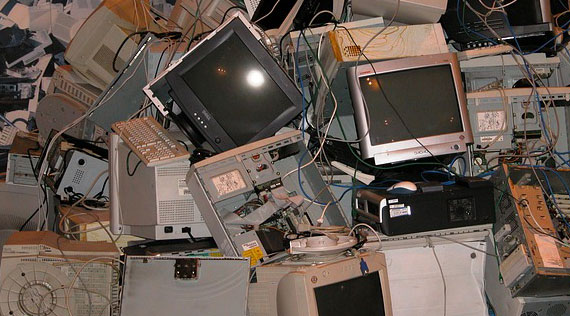
MUMBAI (Scrap Monster): The Committee of Subordinate Legislations (2015-16) chaired by Dilipkumar Mansukhlal Gandhi has urged the Indian government to ensure that e-waste rules in the country are implemented effectively. The report tabled on the Loksabha warned of rising e-waste volumes in the country and emphasized on the urgent need to implement proper mechanisms to counter the menace of mounting electronic waste in the country.
The committee noted that e-waste volumes in India have witnessed exponential growth over the past decade. The report quoted estimates provided by the Central Pollution Control Board (CPCB) which indicates that the country generated 146,800 metric tons of e-waste during 2005. The CPCB statistics further indicate that the e-waste volumes grew alarmingly to 800,000 metric tons by 2012 and doubled to 1.64 million metric tons by 2014. The pace of technological development and economic progress in the country is likely to lead to e-waste volume growth in alarming proportions over the forthcoming years.
The report noted that no serious efforts have been made to address the pitfalls in sound management of electronic waste generated in the country. As of now, there are 151 registered e-waste dismantlers and recyclers in private sectors in 13 states in the country having combined capacity of 4.46 lakh metric tonne per annum. It criticized the administration for not ensuring the existing rules are implemented strictly. More than 95% of the electronic waste in the country is handled by informal sector, which employs primitive techniques to handle the waste. This leads to emission of hazardous chemicals, thereby posing serious threat to environment.
The panel noted that e-waste management is a highly specialized field which requires highest level of technical knowledge and skilled manpower. It cited lack of skilled and experienced manpower in Central and State Pollution Control Boards, which makes them handicapped when it comes to strict implementation of e-waste management rules.
The Committee also suggested that the legislation on e-waste handling be separated instead of handling it as part of Environmental Protection Act 1986. A separate legislation may lead to more effective and meaningful handling of electronic waste. The panel recommended that the legislation should establish a central authority consisting of IT experts and experienced persons possessing comprehensive knowledge of e-waste disposal, management and recycling techniques. Further, the new legislation must ensure setting up of state-of-the-art collection and recycling centres in all major cities of the country. The law should also make it compulsory for residents and commercial establishments to dispose of the discarded electronic waste only at designated collection centres. This is required to prevent environmental pollution caused by improper disposal of e-waste, the panel noted.
According to rough estimates, the country generates nearly 1.8 million metric tons of e-waste every year. This is likely to grow at a CAGR of 30% to touch 5.2 million metric tons per year by 2020. Surprisingly, only 2.5% of this e-waste gets recycled in the country. Apart from locally generated e-waste, the country has been struggling with rising volumes of e-waste shipped from other countries. According to studies conducted by the United Nations Environmental Program (UNEP), the quantity of e-waste exports to India is likely to jump by 500% between 2007 and 2020.
| Copper Scrap View All | |
| Alternator | 0.31 (0) |
| #1 Copper Bare Bright | 3.64 (0) |
| Aluminum Scrap View All | |
| 356 Aluminum Wheels (Clean) | 0.72 (0) |
| 6061 Extrusions | 0.63 (0) |
| Steel Scrap View All | |
| #1 Bundle | 475.00 (0) |
| #1 Busheling | 495.00 (0) |
| Electronics Scrap View All | |